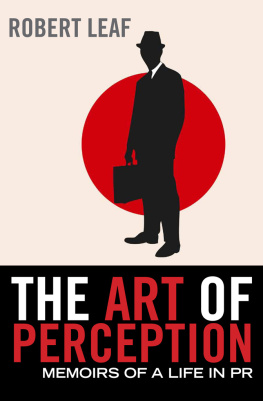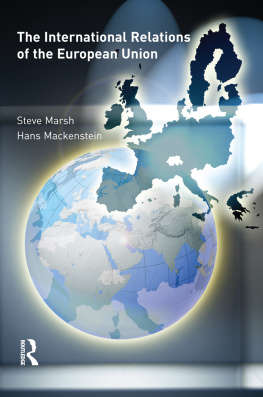The Art of Perception

First published in hardback in Great Britain in 2012 by
Atlantic Books an imprint of Atlantic Books Ltd.
Copyright Robert Leaf, 2012
The moral right of Robert Leaf to be identified as the author of this work has been asserted by him in accordance with the Copyright, Designs and Patents Act of 1988.
All rights reserved. No part of this publication may be reproduced, stored in a retrieval system, or transmitted in any form or by any means, electronic, mechanical, photocopying, recording, or otherwise, without the prior permission of both the copyright owner and the above publisher of this book.
Every effort has been made to trace or contact all copyright holders. The publishers will be pleased to make good any omissions or rectify any mistakes brought to their attention at the earliest opportunity.
10 9 8 7 6 5 4 3 2 1
A CIP catalogue record for this book is available from the British Library.
Hardback ISBN: 978-0-85789-002-3
eISBN: 978-0-85789-959-0
Printed in Great Britain
Atlantic Books
An imprint of Atlantic Books Ltd
Ormond House
2627 Boswell Street
London
WC1N 3JZ
www.atlantic-books.co.uk
Introduction
It was 1970. Nixon was in the White House. Brezhnev was running the Soviet Union, and the Cold War was in full swing. The Russians had recently invaded Czechoslovakia and had an iron grip on the nations of Central and Eastern Europe. So it came as a great surprise that the government-run advertising agencies of Romania, Hungary, Czechoslovakia, Poland and Russia were all interested in hearing about the latest trends in advertising and public relations. I was invited, along with two publishers and another senior executive, to go on a seventeen-day lecture tour around Eastern Europe culminating in a visit to Moscow.
Much to my surprise and delight, we were treated like royalty nearly everywhere we went. We were generously entertained, taken on trips around the region and talked to with incredibly sincere honesty. This was not what I was expecting from our cold war enemies. One of the key local executives proudly told me that his son had translated One Day in the Life of Ivan Denisovich by Aleksandr Solzhenitsyn into Romanian. The book had been outlawed in the Soviet Union and Solzhenitsyn had been expelled from the Union of Soviet Writers for having written it.
The men and women I met were fascinated by our stories about advertising and public relations in the United States and what it was accomplishing there. You would have thought the cold war was a figment of some politicians imagination...
In Czechoslovakia, though, the mood was very different. In Prague, you could still hear the firing of cannons in the outskirts of the city where Russian troops were stationed. Presumably the soldiers were taking artillery practice and reminding the Czech citizenry of their presence and who was boss. Our hosts, who had invited us to their beautiful city, seemed wary of being too close to us Westerners. And who could blame them? Our meetings had a formal air and, unlike all the other countries we visited, there would be no hobnobbing or social activities after the formal discussions were over.
In Moscow we were met with a high degree of cordiality, and were taken as guests to the opera, ballet and numerous museums. We were given English-speaking guides capable of answering our questions. It was obvious that our hosts really wanted us to enjoy their city, and there was a great deal there to see.
Yet, in spite of the warmth and cordiality extended to us, it was obvious that there was still a belief among many Russians that Western marketing techniques were tools of capitalism and thus open to question: should they be used in a communist society, and if so, how? This attitude became increasingly apparent to me during informal discussions I held with some of the audience before a talk I gave at a conference. Even though the audience of government officials, academics and business executives was engaged in advertising, it was still considered an unappealing tool of Western capitalism.
I was the final speaker and gave a presentation on what carefully considered advertising was able to accomplish. When I finished, the floor was open for questions. An academic who I had been talking with before the conference began, asked: Mr Leaf, how can you justify any social good in advertising?
I paused for a long moment while I studied the audience. After some careful thought I replied, Let us say you are trying to sell harvesters you manufacture in Soviet plants to Egypt. And at the same time, Americans are also trying to sell them American-produced harvesters. If the Americans succeed in making the sale, the profits would usually go to individuals in private companies who can use the money in any way they see fit and for their own pleasure. But if you sell the harvesters, you can use the money to build hospitals, improve roads and provide a better life for the more impoverished. But to be able to do this first you have to sell those harvesters. And if it is your advertising that helps you to accomplish this, there is no question that it definitely has a social good.
The professor immediately replied, Mr Leaf I can accept that completely. Looking out at the audience, I got the feeling that he was not the only one who bought my reply.
Ive often thought about this meeting in later years and my response to the learned Russian gentlemens question and what it accomplished. I became more convinced than ever about a strong belief I had always held about the key to successful communications, no matter who the audience is. That key is the need to manage perceptions and that belief is that the public relations business is, in reality, perception management.
The fact that one good answer could change the mind of a very learned man steeped in a particular ideology and change his attitude towards what he saw as a pernicious practice of Western capitalism that showed what changing a perception could accomplish.
My belief is underlined by the fact that my encounter led to a significant client assignment and gave us a chance to create a closer communications tie between the East and West during the cold war. As a result of the conference, I was later able to negotiate a deal for BursonMarsteller (the public relations firm of which I was the international chairman) to represent Vneshtorgreklama, the Russian state advertising agency who hosted our trip to Moscow. The relationship then led to our parent company starting the first Western advertising and PR firm in Russia.
One had to get used to the fact that different perceptions existed there, especially among publishers of trade magazines. If you wanted to place an ad in April, a publisher might schedule it in June or even refuse it on the grounds that there was no need for that particular product. On advertising, the Russian encyclopaedia says something very reflective of local thought on the matter: Methods of capitalist advertising are different, but they all clearly show the character of capitalist trade. Commercial enterprises often advertise useless goods and sometimes goods of poor quality. In Russia, things were very different.
I have found my belief in the importance of perception management to be true from the time I started as the first trainee at BursonMarsteller in New York (they had only six executives at the time) to later when I became international chairman and helped grow the company into the largest PR firm in the world. Throughout my entire fifty-year career in PR, I constantly saw that the way we managed perceptions was a significant factor in our success and also the success of our clients.



















